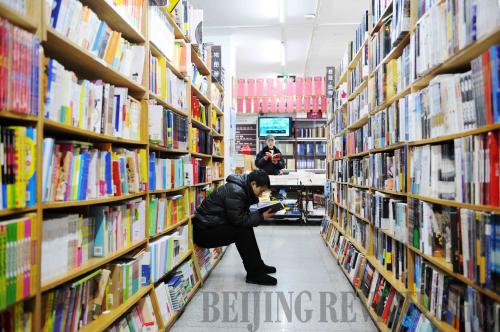|
 |
|
A LONESOME BOOKWORM: A man reads at a bookstore in Harbin, northeast China's Heilongjiang Province, on February 13 (WANG JIANWEI) |
China lacks avid readers, according to a recently published survey of reading habits in 2012. The proportion of people surveyed who reported reading a paperback last year is only 55 percent, about 5 percentage points lower than in 1999.
The Chinese Academy of Press and Publications (CAPP) surveyed reading habits of 18,619 people in 28 provincial-level regions. About 31.3 percent of respondents were under 17 years old, and 26 percent were rural residents.
Chinese people's reading volume trails far behind many countries. Hao Zhensheng, CAPP President, said that South Koreans read an average of 11 books per year, Japanese read 8.5 and French read 8.4.
Only 1.3 percent of those surveyed said that they read a lot, and more than 50 percent admitted not reading enough books.
Forty-three percent of respondents reported "having no time because of busy work" and 35.8 percent "have no reading habit."
Other commonly cited reasons for insufficient reading include "watching too much TV," "not knowing what to read" and "cannot find interesting books."
Unaffordable enjoyment
Leisure-time reading is losing popularity among adults and most people only read to advance their career opportunities, say researchers.
According to a report by Xinhua News Agency in April 2010, around 80 percent of books sold in China were textbooks. This preference for pragmatic reading was supported by the sales statistics of major bookstore chains in China as their bestselling categories were textbooks and study guides for certification exams.
Heavy academic burdens hinder Beijing students' after-school reading, says a report released by the China Youth and Children Research Center in April.
More than 1,400 students in the fourth to seventh grade were surveyed about their extracurricular reading habits. About 52 percent electively read for about 30 minutes and about 12 percent read less than 15 minutes outside of regular studies, according to the report.
Lu Min, a researcher who led the survey, said that the research team found students didn't have much time for reading because they had to finish homework or attend after-school classes.
"The students don't take up a good reading habit. Therefore, during their limited spare time, they prefer to watch television, play online games or chat online," Lu said.
Only 35 percent of students read for at least an hour after school, and half of the total said that they prefer digital reading. The report says that half of students go to school libraries once a week while 7.7 percent never go.
Fragmented reading
According to the CAPP poll, 97.9 percent of Internet users read books, periodicals or newspapers online at some time last year, compared with 96.4 percent in 2011.
Renowned writer Han Shaogong said that digital reading offers a fragmented style of reading that significantly reduces the amount of knowledge readers can absorb from a publication.
A China Youth Daily report explains the "fragmented reading" as with use of reading software or apps, people tend to start reading books without finishing, or even forget ever having read a book.
"Digital reading makes it convenient for people to read whenever and wherever they want, but other entertainment functions of digital devices often distract readers. I believe that people still have to rely on paperbacks if they want to really digest the contents of a book," said Jin Lihong, Vice President of the Changjiang Literature and Art Publishing House in Wuhan, central China's Hubei Province.
Lu also said that when reading books on digital devices, students tend to give up reading when links to games, videos and other entertainment pop up.
| 